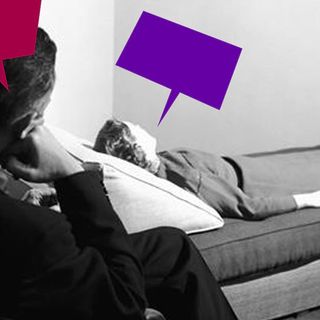
Let’s Talk About Mental Health
Open up your brain and say ‘Ah.’

On Thursday, a group of four people, each with different perspectives on mental health in India, will gather to discuss how we can better take care of our minds, not just our bodies. We got a preview of “Why We Need to Talk About Mental Health Now” when we recently sat down with panelists Sonali Gupta, psychologist (who, full disclosure, is a former contributor to The Swaddle); Ratnaboli Ray, a mental health rights activist and founder of Anjali; Meera Damji, host of the radio show Heart to Heart with Meera; and Nikhil Taneja, host of the upcoming podcast Work In Progress. The interviews that follow are edited for clarity.
THE SWADDLE: So the first question has to be — why is it so important to be talking about mental health now? What is it about the current moment and milieu that makes it ripe for this conversation?
Sonali Gupta: I feel social media and pop culture narratives have opened these conversations, giving them a momentum like never before. The increasing number of suicides, and the substantial rise in the number of people struggling with mental health concerns, tells us that, as a nation, our ecosystems need to be geared to build more resilience, to address these concerns. We, as a society, need to acknowledge how mental health has been given [poor] treatment.
We are also paying a huge price in the context of decline in productivity, efficiency, dropout rates at educational institutions, breaking down of relationships, financial costs as an economy and most importantly, loss of human life.
THE SWADDLE: How have attitudes and perceptions of mental health changed or evolved up until this point?
Ratnaboli Ray: Change has taken place, but also in many things, they have remained the same.When I started work, it was very difficult to imagine that people with mental illness could recover from it. At that time my advocacy concentrated on people getting treatment.
Today, with globalization, we are at an in-between stage, where many more are aware of mental health issues, but the treatment methods in mental health services are traditional. That creates a conflict.
THE SWADDLE: Where there is conflict, there is room for misunderstanding. Is there a risk of conflating clinical mental illness and general discussions of self-care and wellness?
SG: There is a misconception around how we see mental health as only from a lens of disorder. This makes it harder to work on concerns which have to do with improving life quality and effective coping strategies.
Nikhil Taneja: And there is so little written on mental health that, the moment anyone hears the term, people believe it’s to do with clinical illness. [But] the only reason there is a risk for people to confuse mental illness with mental health conversations is because there is such a deep lack of awareness on these issues. No one confuses a common cough and cold with TB, or headaches with something like brain tumour. And the reason is because there is a general awareness that illnesses happen on a spectrum.
We need more dialogue about the spectrum of mental health, especially the more common issues that are associated with big city life like stress or loneliness or anxiety and depression, so people are aware that these are actual issues that require medical help or therapy, depending on the severity of the issue.
THE SWADDLE: What role does media play in fostering this dialogue?
Meera Damji: Media has the capacity to play a very vital role in destigmatising mental health. The ease of access to media makes it a very powerful tool today, something that cannot be ignored at all. Media today does not only disseminate information, but also puts forth opinions which people easily and unknowingly adopt and imbibe. Therefore, it is the greatest vehicle to send out messages that are relevant to this hour.
But all this also makes media a double-edged sword. Hence, responsible and factual reportage is as important as spreading awareness. It’s easy to slip into sensationalism and clickbait articles, which can have damaging effects like typecasting and labeling.
NT: The thing is, the media hasn’t portrayed it at all. Mental health isn’t much of a narrative that’s been out there in any kind of media, except very recently. Severe mental illnesses like schizophrenia or mania or psychosis may be portrayed in films every once a while, but the other issues on the mental health spectrum are often used casually in conversation, for example, when people say they are depressed or anxious. For that matter, the media has seldom linked suicides to mental health issues, even though they are often at the crux of such cases.
THE SWADDLE: This idea of narrative comes up a lot in mental health conversations. What value do personal stories have within the broad conversation about mental health?
MD: Considering that, by and large, conversations around mental health are very few even amongst one’s closest, personal stories make the topic more relatable. They are testimonials which not only help in spreading awareness and destigmatising the subject but they also make the situation more identifiable for someone who is dealing with similar circumstances. They can instill confidence in such people to accept and address their condition.
NT: People will only get sensitised about mental health if these stories are brought out in the open, and not spoken discreetly within closed circles.
RR: We have to say that mental illness is very ordinary. That recovered people are also ordinary. That people can bounce back. We need narratives from different sections of society to come and talk about their mental health problems. Then the otherization might end.
THE SWADDLE: Some public figures have recently shared their own mental health struggles. Do these narratives help?
MD: Of course, public voices sharing their personal stories gives mental health a spot in the media. It makes the topic relevant and captures the attention of people. In short, they become ambassadors for addressing mental health concerns with honesty. However, at times these issues also become aspirational traits for the general public which tends to shift the focus from the main issue to the symptom.
RR: One Deepika Padukone cannot eradicate stigma. Though she did a great job talking about it. But when you have a person with no money, with little or no education, honour becomes the only social capital. A person with a mental disorders becomes a mark on the family.
THE SWADDLE: And, extrapolating from an individual family’s mark, a societal stigma?
RR: Stigma is the most overwhelming problem that we have here in India. Stigma is so internalised, learnt over so much time, that it is very difficult to eradicate.
SG: The stigma attached to seeking help exists across gender and class.
RR: And we need to address institutional stigma that the government shows. Budget allocation is so poor and there are no community based services. And services that are delivered by civil society or the NGO sector are not enough. Unless and until the government takes proactive steps, how can we blame common people?
THE SWADDLE: What’s the result of all of this — no conversations, no narratives, but lots of stigma?
SG: Seeking mental health is expensive in [metros], and there are not enough professionals, as compared to the demand. And poor, people in villages and small towns have very little access to psychiatrists and therapists — [but also lack] an understanding of when to seek help. Lastly, the funds allocated at State level [for mental health], barely exist, with no solid strategic policies to address the issue.
THE SWADDLE: What has to change?
RR: Access to mental health care needs to become a fundamental right. We need more medical professionals, churn more psychiatrists. Get youngsters to choose psychiatry over surgery.
[In the meantime] the government [needs] to show interest in new technologies and ideas of treatment of people with mental health disorders. Community-based mental health services need to be started. We need to look at lay professionals who can implement mental health programs in village – like the free clinic movement, which was started by Sigmund Freud.
—
“Why We Need to Talk About Mental Health Now” will be held at 5:30pm, Thursday 5 April, at the Godrej Culture Lab. It is free and open to the public.
Related


Kids Are Being Given Too Many Antibiotics They Don’t Need
